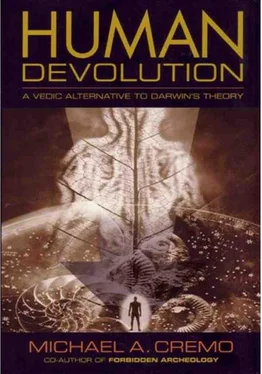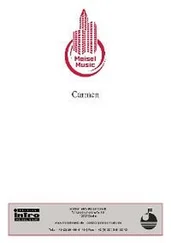Michael Cremo - Human Devolution - A Vedic Alternative To Darwin's Theory
Здесь есть возможность читать онлайн «Michael Cremo - Human Devolution - A Vedic Alternative To Darwin's Theory» весь текст электронной книги совершенно бесплатно (целиком полную версию без сокращений). В некоторых случаях можно слушать аудио, скачать через торрент в формате fb2 и присутствует краткое содержание. Год выпуска: 2003, ISBN: 2003, Издательство: Torchlight Publishing, Жанр: Старинная литература, на английском языке. Описание произведения, (предисловие) а так же отзывы посетителей доступны на портале библиотеки ЛибКат.
- Название:Human Devolution: A Vedic Alternative To Darwin's Theory
- Автор:
- Издательство:Torchlight Publishing
- Жанр:
- Год:2003
- ISBN:9780892133345
- Рейтинг книги:4 / 5. Голосов: 1
-
Избранное:Добавить в избранное
- Отзывы:
-
Ваша оценка:
- 80
- 1
- 2
- 3
- 4
- 5
Human Devolution: A Vedic Alternative To Darwin's Theory: краткое содержание, описание и аннотация
Предлагаем к чтению аннотацию, описание, краткое содержание или предисловие (зависит от того, что написал сам автор книги «Human Devolution: A Vedic Alternative To Darwin's Theory»). Если вы не нашли необходимую информацию о книге — напишите в комментариях, мы постараемся отыскать её.
Human Devolution: A Vedic Alternative To Darwin's Theory — читать онлайн бесплатно полную книгу (весь текст) целиком
Ниже представлен текст книги, разбитый по страницам. Система сохранения места последней прочитанной страницы, позволяет с удобством читать онлайн бесплатно книгу «Human Devolution: A Vedic Alternative To Darwin's Theory», без необходимости каждый раз заново искать на чём Вы остановились. Поставьте закладку, и сможете в любой момент перейти на страницу, на которой закончили чтение.
Интервал:
Закладка:
Alexis then gave an exact description of Townshend’s house in norfolk Street, London, a house only recently acquired. Townsend noted: “He gave an exact description of the two women-servants—one old, one young. . . . He seemed pleased to describe the young one minutely, whom he thought pretty. He made no single mistake as to the colour of eyes, or hair, etc.” Alexis correctly said there was a park in front of the house, and that the furniture was of the Louis XIv style. He went on to give correct descriptions of the furnishings of different rooms, including three paintings. The first he identified as a picture with a woman and two children, a depiction of the holy family, by Raphael; the second as a painting of a stormy sea; and the third as a painting of the interior of a stable, with a grey horse lying down. All of the identifications were correct.
Townshend then decided to test Alexis’s ability to read words from book pages hidden from his view. Townshend brought from another room a copy of Lamartine’s Jocelyn. He opened the book to a certain page. With closed eyes, Alexis read some lines. He then offered to read some lines from a page not open, and asked Townshend to specify the number of pages below the open one. Townshend asked him to read something from the page eight pages below the open one. Townshend reported: “He then traced with his finger slowly along the page that was open, and read, a dévoré d’un jet toute ma sympathie. I counted down eight leaves from the leaf first opened, and found, exactly under where his finger had traced, the line he had read, correct , with the exception of a single word. He had said déchiré instead of dévoré .”
“Human incredulity began to stir in me,” said Townshend, “and I really thought perhaps Alexis knew Jocelyn by heart. So I again went to a drawer in the next room, and brought out a large book I had also bought that day—a sort of magazin pittoresque, called les beaux arts . This, at least, Alexis could not know by heart. Again, the same wonder was performed. I have forgotten the exact place, which I omitted to mark as I did in Jocelyn (in which the pieces of paper I put to specify the marvel still remain), but I certify that Alexis read in les beaux arts , also, several words many pages below the page he had open before him. Still, to make all sure, I brought forth an English book, the inheritance , Miss ferrier’s clever novel of years ago, and in this he read the name of Gertrude , and other words at the distance of many leaves. With regard to all the books, they were opened but once, and kept open at the place first opened, and Alexis never touched the leaves.”
Alexis then asked Townshend if he had received a letter from a person in whom he was interested. He expressed a wish to reveal some things about the letter. Townshend then produced a letter he had recently received from a lady. Townshend noted, “The letter was enclosed in a perfectly opaque envelope, which Alexis (and I carefully watched him) never attempted to disturb. He held it quietly in his hand.” Alexis first indicated there was inside a piece of newspaper, bearing the words “brotherhood of nations.” There was in fact a newspaper clipping about a peace society enclosed with the letter. Alexis then took a pencil and wrote on the outside of the envelope the address of the lady who had written the letter. “But now—marvel of marvels!” wrote Townshend. “Alexis told me the whole history of my fair correspondent—how long I had known her, and many minute circumstances respecting herself and our acquaintance—something too about the character of her sister, and (to crown all) he wrote (still on the outside of the letter) both the christian and family name of her father!” Alexis went on to give many details about the personal health and history of Townshend.
dr. Elliotson, editor of the Zoist, appended to Townshend’s account other proofs of Alexis’s clairvoyance. for example, Monsieur Sabine, chief of the railway station at Le Havre came to see Alexis. Before Sabine spoke, Alexis, who was at the time in trance, said, “You come about something lost in the service to which you belong.” Sabine replied, “It is true.” Alexis then asked, “You are employed on the Havre Railroad?” Sabine again replied it was true. Alexis told Sabine that the missing object was a basket full of leeches (used in medical practice, for sucking blood or other fluids). Sabine replied that two baskets of leeches were missing. Alexis told Sabine that one of the baskets had been taken off the train by mistake at Rouen, and it had been placed on a large horsedrawn carriage from the station into town. A conductor found it later on the carriage, unclaimed. Alexis said: “from fear of being scolded he did not deposit it in the baggage warehouse, but hid it for some days in his stable; and while it was there you wrote to Rouen . . . about it, the reply being that it could not be found. A few days ago the conductor put it in the goods depot, near the entrance and beneath the first window on the right. You will find it if you set off to Rouen; only, on account of the length of time that has elapsed, you will find about 200 leeches dead.” Sabine went to Rouen the next day and found the basket in the place indicated by Alexis, with 200 of the leeches dead.
Eric dingwall, author of abnormal Hypnotic Phenomena, gives this summary of Alexis didier’s explanation of the mechanics of his gift: “There passed within him, he wrote, something indefinable, tending to convulse both his nerves and limbs and upsetting his whole interior being. The interior vision of the spirit then became open to endless horizons and later, after this painful sensation had subsided, a feeling of wellbeing took its place and material obstacles became transparent, so that vision was no longer obstructed. He could without fatigue, transport himself from one side of the earth to the other; talk with Africans, walk about in china, descend Australian mines and even enter the harem of a sultan. The soul only had to wish and it was everywhere; space and time were annihilated and events of centuries became present to the interior vision, so that occurrences long past could be evoked for the purposes of description. for Alexis, lucidity, like mediumship, was not something which could be learnt: it was innate; but once there it could be developed and the power could be intensified. Belief in the soul was essential if lucidity was to be understood. The aim of somnambulism was to demonstrate the powers which primitive man enjoyed and in particular that which the soul will possess when death liberates it from the body” (didier 1856, p. 15; in dingwall 1967, pp. 199–200). Adolphe didier’s abilities matched those of his brother. G. Barth (1853) described some experiences regarding Adolphe’s clairvoyance in the Zoist. Barth was engaged by two aristocratic English army officers to test Adolphe. Barth mesmerised Adolphe, who agreed to try to read unseen pages in a book. One of the officers took a book at random from a shelf, and, holding the book behind him, asked Adolphe to identify it. Adolphe correctly gave the title of the book—voyage en Suisse. The officer then asked Adolphe to read the first four lines on page 27. Barth (1853, p. 409) stated: “Adolphe immediately repeated several sentences in french. On opening the book and turning to page 27, we found that Adolphe had correctly read four lines from the 27th page of a closed book . . . entirely out of all the possible range of natural vision. He then went mentally to a nobleman’s residence in one of the midland counties, and described it most accurately even to the pictures and the costumes of the portraits hanging in the dining-hall.”
Читать дальшеИнтервал:
Закладка:
Похожие книги на «Human Devolution: A Vedic Alternative To Darwin's Theory»
Представляем Вашему вниманию похожие книги на «Human Devolution: A Vedic Alternative To Darwin's Theory» списком для выбора. Мы отобрали схожую по названию и смыслу литературу в надежде предоставить читателям больше вариантов отыскать новые, интересные, ещё непрочитанные произведения.
Обсуждение, отзывы о книге «Human Devolution: A Vedic Alternative To Darwin's Theory» и просто собственные мнения читателей. Оставьте ваши комментарии, напишите, что Вы думаете о произведении, его смысле или главных героях. Укажите что конкретно понравилось, а что нет, и почему Вы так считаете.












